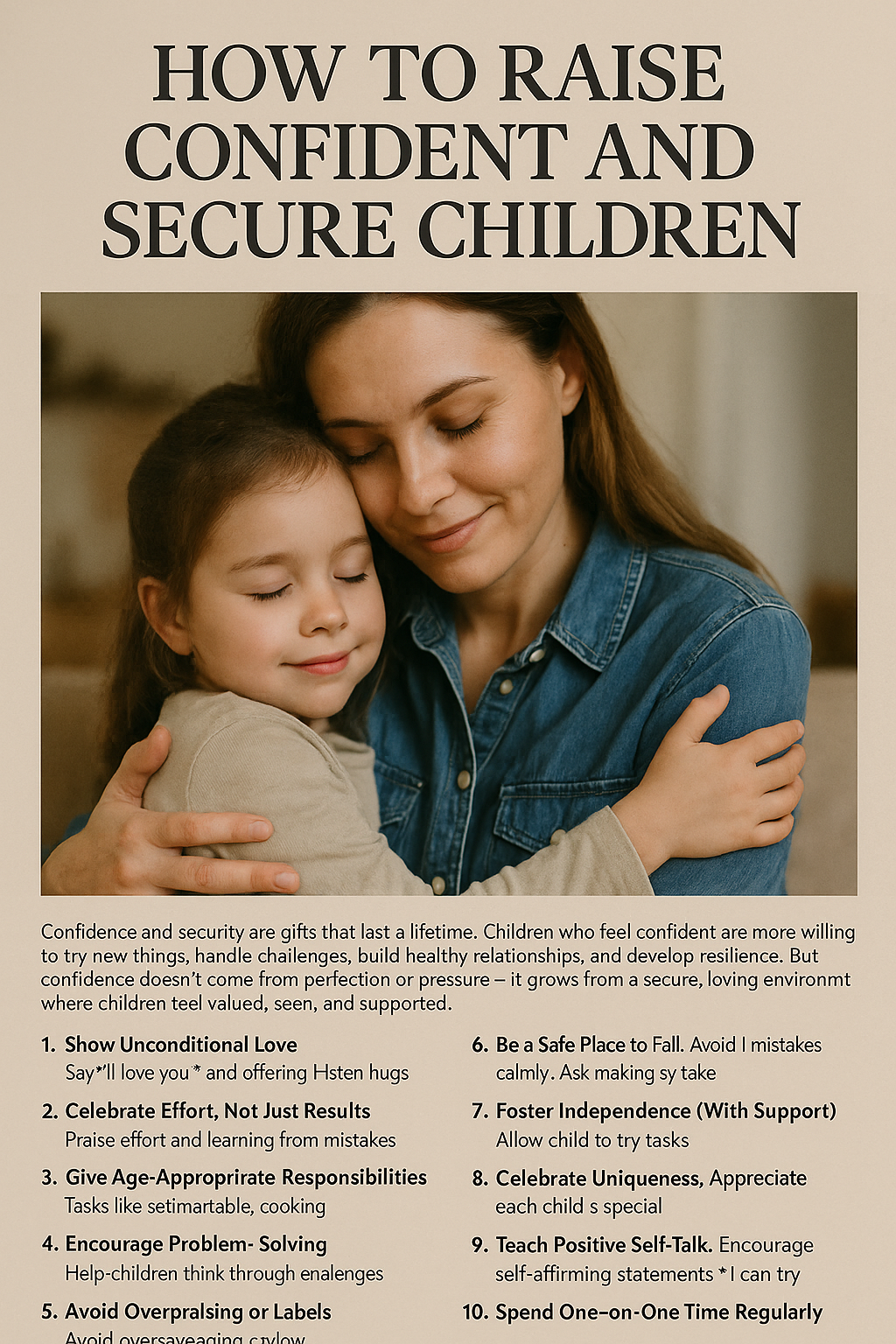Confidence and security are gifts that last a lifetime. Children who feel confident are more willing to try new things, handle challenges, build healthy relationships, and develop resilience. But confidence doesn’t come from perfection or pressure — it grows from a secure, loving environment where children feel valued, seen, and supported.
In this article, you’ll learn practical, non-medical strategies to help your child develop strong self-esteem and emotional security.
Why Confidence and Security Matter
Children who feel secure and confident are more likely to:
- Take healthy risks and try new things
- Manage failures without giving up
- Build stronger relationships
- Communicate their needs effectively
- Develop emotional resilience for life’s challenges
A confident child isn’t one who never struggles — it’s one who believes they can get through the struggle.
1. Show Unconditional Love
Confidence starts with knowing they are loved no matter what.
How to show it:
- Say “I love you” often — not just when they succeed, but always.
- Offer hugs, smiles, and gentle touches throughout the day.
- Be present during conversations, even when you’re busy.
When children feel emotionally safe, they develop the courage to face the world.
2. Celebrate Effort, Not Just Results
Focus on the process, not the outcome.
Say:
- “I’m proud of how hard you tried.”
- “You kept going even when it was tricky — that’s amazing.”
- “It’s okay to make mistakes; that’s how we learn.”
This builds a growth mindset rather than fear of failure.
3. Give Age-Appropriate Responsibilities
Doing meaningful tasks builds a sense of capability.
Examples:
- Toddlers: Put toys away, help feed pets
- Preschoolers: Water plants, set the table
- School-age kids: Help with cooking, fold laundry, pack backpacks
When children contribute, they feel valuable and capable.
4. Encourage Problem-Solving
Let your child make choices and solve small problems.
Try:
- “What do you think we should do about this?”
- “Do you want to try it this way or that way?”
- Support them when they make decisions, even if it’s not perfect.
Independence strengthens confidence.
5. Avoid Overpraising or Labels
While praise is good, overpraising can create pressure.
Avoid:
- “You’re the smartest!” (Can cause fear of failure)
- “You’re always the best!” (Sets unrealistic expectations)
Instead say:
- “You worked really hard on this.”
- “I can see how focused you were.”
This builds internal motivation rather than external validation.
6. Be a Safe Place to Fall
Let your child know it’s okay to make mistakes.
Practice:
- Stay calm when they spill, break, or mess up.
- Use mistakes as learning moments: “What can we do differently next time?”
- Avoid harsh criticism or shame.
A safe home allows confidence to grow without fear.
7. Foster Independence (With Support)
Encourage your child to try tasks on their own, but stay nearby for support.
Say:
- “I’m right here if you need me.”
- “Let’s figure it out together.”
Over time, they’ll rely less on help and more on their own abilities.
8. Celebrate Uniqueness
Help your child appreciate what makes them special.
Say:
- “I love how creative you are.”
- “Your kindness makes a difference.”
- “You have such great ideas.”
Appreciating their strengths teaches them to value themselves.
9. Teach Positive Self-Talk
Model how to be kind to yourself.
Example:
- “I made a mistake, but that’s okay — I can fix it.”
- Teach them to say, “I can try again,” or “I’m learning.”
Positive self-talk becomes their inner voice as they grow.
10. Spend One-on-One Time Regularly
Individual attention tells your child, “You are important.”
Ideas:
- 10 minutes of focused play each day
- A special weekly walk, game, or baking session
- Letting them pick an activity just for the two of you
Connection is the foundation of security.
Final Thoughts: Confidence Grows from Connection
Confident, secure children aren’t born — they are raised in environments full of love, encouragement, boundaries, and trust. When you show up with presence, patience, and belief in your child’s abilities, you help them believe in themselves.
Your words become their inner voice. Your support becomes their courage. And the love you show becomes the foundation from which they’ll explore the world with confidence.
